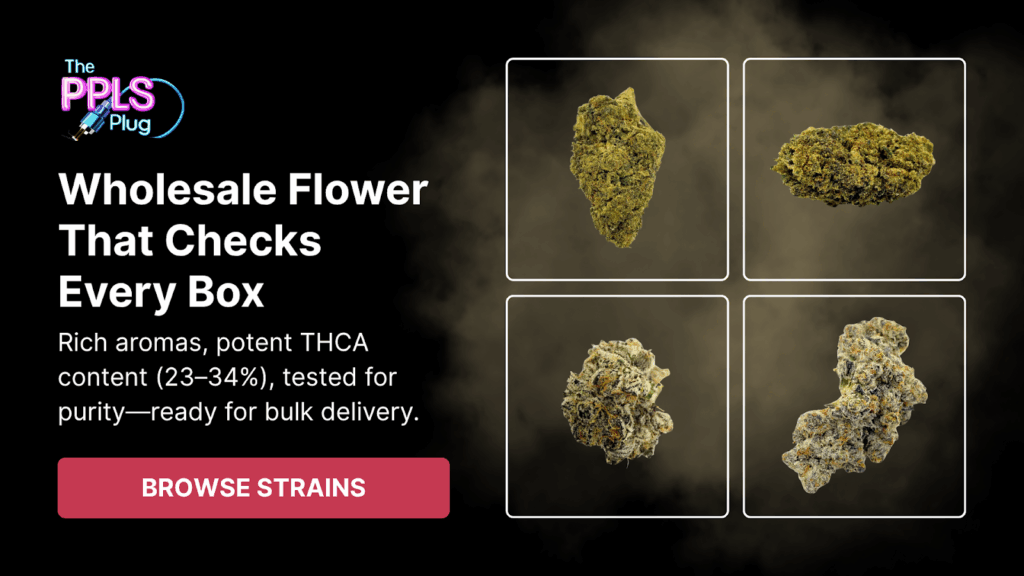How To Open A Dispensary In Illinois: Costs, Laws, And Key Steps
Key Takeaways:
- Illinois dispensary startup costs are significant—covering licensing, real estate, security, and inventory, making financial planning essential.
- Strict Illinois cannabis regulations demand compliance with zoning laws, product testing, packaging standards, and ongoing employee training.
- Wholesale partnerships like ThePplsPlug support scalability with lab-tested products, compliant packaging, and consistent inventory flow.
Launching a dispensary in Illinois is a bold entry into one of the country’s most dynamic and tightly regulated cannabis markets. With adult-use and medical sales generating billions statewide, the opportunity is real, but so are the challenges. Every step from licensing and location scouting to compliance and product sourcing requires strategic planning, legal precision, and operational readiness.
Understanding the full landscape, from startup costs to regulatory hurdles, is critical for aspiring dispensary owners to turn a vision into a licensed, profitable business. At ThePplsPlug, we work with entrepreneurs and operators at every stage of the journey, supplying lab-tested products, streamlined wholesale services, and trusted partnerships that fuel long-term growth.
This guide breaks down what it really takes to open a dispensary in Illinois, clearly, practically, and with your success in mind.
Understanding Illinois Cannabis Laws & Regulations
Illinois maintains some of the strictest compliance frameworks in the country, reflecting its commitment to public safety and the responsible growth of the cannabis sector. Becoming proficient in the rules and processes at both the state and local levels is crucial for aspiring dispensary owners seeking long-term success within this evolving industry.
Licensing Structure & Application Overview
Illinois operates with a merit-based licensing system, requiring potential applicants to undergo a comprehensive review process. There are several license types relevant to dispensaries, but the “Adult Use Dispensing Organization License” covers most retail operations.
Applicants must submit detailed business plans, community engagement strategies, and security protocols. The process is competitive, with special points awarded for social equity applicants and those demonstrating strong ties to underserved communities.
Zoning, Location, And Municipal Requirements
While state laws set baseline standards, local municipalities have substantial authority over cannabis enterprises. Many cities and counties have zoning restrictions determining where a dispensary can be located, often requiring a minimum distance from schools, parks, and certain residential areas.
Some municipalities require additional permits, whereas others ban dispensaries entirely. Early research and engagement with local officials are essential to secure a compliant location and anticipate potential regulatory obstacles.
Compliance, Security, And Operational Protocols
Regulatory compliance in Illinois extends far beyond the initial application. Dispensaries must implement robust tracking systems, adhere to inventory management rules, and facilitate safe storage and transportation of cannabis products.
The state requires detailed security measures, including 24/7 surveillance, access controls, and alarm systems, to protect both employees and patrons. Ongoing staff training on compliance, safe selling practices, and responsible consumer education is mandated by state law and subject to routine inspections.
Product Sourcing & Packaging Standards
All cannabis products sold in Illinois dispensaries must be sourced from state-licensed cultivators and manufacturers. Each product must undergo state-mandated testing for potency and contaminants, and dispensaries are responsible for ensuring every item is correctly labeled with dosage, ingredients, and safety warnings. Packaging must be child-resistant and compliant with Illinois’ detailed rules to minimize the risk of accidental ingestion or misuse.
Startup Costs To Open A Dispensary In Illinois
Before launching a dispensary in Illinois, understanding the full scope of startup costs is essential. The state’s legal framework and competitive marketplace require a significant upfront investment, but careful planning can help position your business for sustainable success. Below, we break down the primary categories of expenses you’ll need to consider.
Licensing And Application Fees
Securing the necessary licenses is the first major financial commitment. Illinois mandates a non-refundable dispensary license application fee, followed by an annual license cost upon approval. These government-imposed fees add up quickly, so budgeting for them early is critical.
Real Estate And Facility Build-Out
Location is everything in the cannabis industry. Whether leasing or purchasing, securing compliant real estate represents a substantial investment. Expect costs for zoning approval, additional security requirements, and extensive facility renovations to meet state regulations. Build-out expenses also include shelving, safes, surveillance systems, and storefront enhancements vital for regulatory compliance and customer safety.
Compliance And Security
Illinois law requires robust security systems, including 24/7 surveillance, secure product storage, and alarm systems. Costs also extend to developing and maintaining standard operating procedures, compliance audits, and employee training. These measures are not just legal requirements; they also safeguard your inventory and customers.
Inventory And Initial Stock
Initial product purchases form a significant part of startup costs. Buying cannabis flower, concentrates, and related products in bulk demands considerable capital. Additionally, tracking software and point-of-sale systems are necessary investments for managing inventory, transactions, and compliance reporting.
Operational And Administrative Expenses
Finally, dispensaries must factor in various operational costs. These include employee salaries, insurance, utilities, marketing, and professional fees for legal and financial consultation. Establishing a strong administrative foundation at launch ensures efficient business operations and reduces the risk of regulatory setbacks.
Choosing The Right Location For Your Illinois Dispensary
Selecting the optimal location is pivotal in launching a successful dispensary in Illinois. Beyond the basic need for visibility and accessibility, your site must comply with state and local zoning regulations, resonate with your target demographics, and set the foundation for long-term business growth. Let’s explore the key considerations in detail.
Understanding Zoning Laws And Compliance
Illinois law strictly regulates where dispensaries can operate. Prospective owners must ensure the location is appropriately zoned for cannabis retail, which typically prohibits establishments within a set distance from schools, parks, and residential neighborhoods.
Local municipalities may have even stricter requirements. Before signing any lease or purchase agreement, consult with municipal zoning offices to verify permissible use and begin the Special Use Permit process if required.
Assessing Demographics And Community Impact
The neighborhood’s character will heavily influence your dispensary’s customer base and reputation. Analyze local population data, average income levels, traffic patterns, and proximity to complementary businesses. Engaging with community leaders and attending local meetings demonstrates transparency and helps foster positive relationships, increasing the odds of local approval and long-term success.
Navigating Competition And Market Saturation
Carefully research the marketplace to assess existing dispensary density and identify underserved areas. Opening in a region already crowded with cannabis retailers can make it challenging to capture new customers, while underserved neighborhoods may offer significant growth potential. Utilize market analysis tools and consult with local business advisors to make informed decisions.
Prioritizing Accessibility And Infrastructure
Consider locations that offer ample parking, are accessible to pedestrians and public transport, and meet ADA requirements. The infrastructure should support secure product storage, efficient customer flow, and regulatory surveillance systems. Efficient access is not just about compliance; it’s about creating a welcoming, safe, and inclusive environment for all patrons.
Building A Compliant And Knowledgeable Team
As Illinois’ cannabis market rapidly expands, assembling a team that understands regulatory compliance and customer service is a cornerstone of successful dispensary operations. The legal and operational complexities in this industry require thorough planning in your hiring and ongoing training processes.
Understanding Illinois Cannabis Regulations
The backbone of any dispensary team is a deep, practical understanding of Illinois’ rigorous cannabis laws. Every staff member, from management to front-line budtenders, should be well-versed in state licensing requirements, sales limits, age restrictions, security protocols, and inventory control mandates. Ongoing compliance training, both at onboarding and through regular refreshers, ensures no one falls behind as laws evolve.
Prioritizing Customer Experience And Product Knowledge
Building trust within the community means going beyond compliance to deliver informed service. Cannabis consumers today expect knowledgeable guidance, whether seeking wellness solutions or specific product recommendations. Investing in continuous education for your team about strains, consumption methods, and product effects nurtures customer loyalty and bolsters your dispensary’s credibility.
Creating An Inclusive And Ethical Workplace Culture
A thriving dispensary isn’t just compliant, but also cultivates a positive, community-driven workplace. Foster an environment where open communication and ethical standards are promoted at every level. This extends to fair hiring practices, ongoing professional development, and a focus on diversity and inclusion, all of which contribute to a motivated workforce aligned with your business mission.
Sourcing Inventory: Wholesale Partnerships With ThePplsPlug
At ThePplsPlug, we help retailers and entrepreneurs secure consistent access to premium wholesale products, supporting everything from daily operations to future expansion.
Secure Supply Means Smoother Operations
Maintaining a steady inventory flow is critical to keeping your shelves stocked and your customers happy. Through dependable sourcing from ThePplsPlug, dispensary owners avoid delays and stockouts, especially for high-demand categories like THCA flower, vapes, and concentrates. This reliability helps strengthen customer loyalty and supports predictable revenue streams.
Bulk Buying With Confidence
Working with wholesale partners like ThePplsPlug makes it easier to reduce per-unit costs while gaining access to diverse, compliant inventory. Our pricing structure and low MOQs (minimum order quantities) help you scale smart while preserving your margins.
Quality That Protects Your Brand
We prioritize third-party testing, compliant packaging, and traceable sourcing so that you can focus on sales, not safety concerns. Our commitment to quality assurance means you’re always aligned with Illinois’ evolving cannabis regulations.
Built For Growth
As your business grows, your needs change. That’s why ThePplsPlug supports multi-location operators and expansion-focused startups with flexible fulfillment, responsive service, and a catalog that evolves with the market.
Final Checklist Before Launching Your Dispensary
As you prepare to open your dispensary in Illinois, a thorough pre-launch review ensures compliance, operational readiness, and a smooth public debut. The following checklist walks you through the essential last steps to safeguard your investment, maintain community trust, and launch on solid ground.
Compliance And Licensing Review
- Confirm that all state and municipal licenses are current and prominently displayed.
- Double-check your documentation of security systems, product tracking, and employee credentials, as required by Illinois cannabis laws.
- Verify that your Standard Operating Procedures (SOPs) are up-to-date and tailored to legislative changes or local ordinances.
Facility And Inventory Preparation
- Conduct a final inspection of your premises to ensure that security systems, cameras, alarms, and secure storage are fully operational.
- Audit your initial inventory to confirm that SKUs are properly tracked and labeled per Illinois regulations, including batch numbers and lab results.
- Create documented processes for daily inventory control, waste disposal, and recall readiness.
Staff Training And Readiness
- Reconfirm that all employees have completed required training, including Responsible Vendor Training, and understand your internal protocols.
- Run through customer service simulations and role-play scenarios to ensure a professional, compliant retail experience.
- Assign clear roles for opening day, covering everything from point-of-sale to compliance monitoring.
Marketing, Community Relations, And Soft Launch
- Review your approved marketing materials and website content for compliance with Illinois cannabis advertising standards.
- Engage with your local community through outreach programs, informational sessions, or a soft-opening event to build trust and visibility.
- Establish a channel for customer feedback to identify areas for improvement as you scale up operations.
By checking off these core areas, you set the stage for Illinois’s confident and compliant dispensary launch.
Final Thoughts
Opening a dispensary in Illinois requires more than just capital; it demands strategic foresight, a thorough understanding of regulations, and reliable partnerships. From navigating licensing to selecting the right location and building a compliant team, each step plays a critical role in shaping long-term success. By planning carefully and aligning with trusted wholesale partners like ThePplsPlug, entrepreneurs can enter this competitive market with confidence, sustainability, and a clear path to growth.
Frequently Asked Questions About How To Open A Dispensary In Illinois: Costs, Laws, And Key Steps
What are the basic requirements to open a dispensary in Illinois?
To open a dispensary in Illinois, you must be at least 21 years of age and meet particular residency and background check criteria. The business must be registered as a valid legal entity within Illinois. A detailed business plan, proof of sufficient capital, a security strategy, and a compliant facility location are essential. Additionally, your dispensary must comply with all local zoning laws and acquire local approval before state applications can proceed.
What licenses are needed to operate a dispensary in Illinois?
Dispensary owners must secure a state-issued Adult Use Dispensing Organization License from the Illinois Department of Financial and Professional Regulation (IDFPR). If you plan to sell medical cannabis, a separate state license for medical dispensaries is also required. Local municipalities may require additional authorizations, so it’s critical to research local regulations as part of your pre-application due diligence.
What are the annual fees associated with maintaining a dispensary license?
Annual fees for maintaining a dispensary license in Illinois depend on the license type and ownership structure. Initial application fees typically start at $5,000, with annual renewal fees ranging from $60,000 to over $100,000. Depending on program criteria, social equity applicants may be eligible for reduced fees. These licensing costs are separate from local compliance obligations and ongoing operational expenses.
Are there limits on the number of dispensaries in Illinois?
Yes, Illinois has established regulated caps on the total number of dispensary licenses issued statewide. The state periodically opens application windows for new licenses based on geographic region and market demand, which can affect new businesses’ competition and market entry strategies. Staying updated with IDFPR announcements is key to entering this growing industry.
What background checks are required for dispensary owners?
All principal officers, owners, and relevant employees must undergo comprehensive fingerprint-based background checks, these checks review for felony convictions, financial crimes, and compliance with Illinois’ cannabis laws. A record involving certain violent offenses or drug-related crimes may disqualify an applicant from licensure.
Are there residency requirements for dispensary owners in Illinois?
Yes. Illinois mandates that residents hold at least 51% of ownership and control in a dispensary. Residency is defined by continuous physical presence and domicile in Illinois for a set period, typically at least two years before the application date. Social equity programs may provide further guidance or benefits related to residency and ownership qualifications.
Latest Products
-
 Rated 0 out of 5Select options This product has multiple variants. The options may be chosen on the product pageLog In to see prices
Rated 0 out of 5Select options This product has multiple variants. The options may be chosen on the product pageLog In to see prices -
 Rated 0 out of 5Select options This product has multiple variants. The options may be chosen on the product pageLog In to see prices
Rated 0 out of 5Select options This product has multiple variants. The options may be chosen on the product pageLog In to see prices




